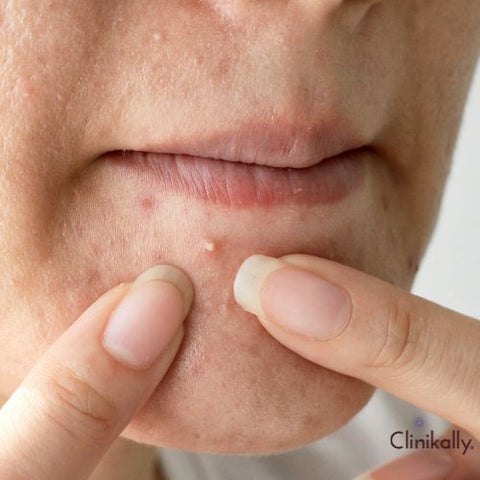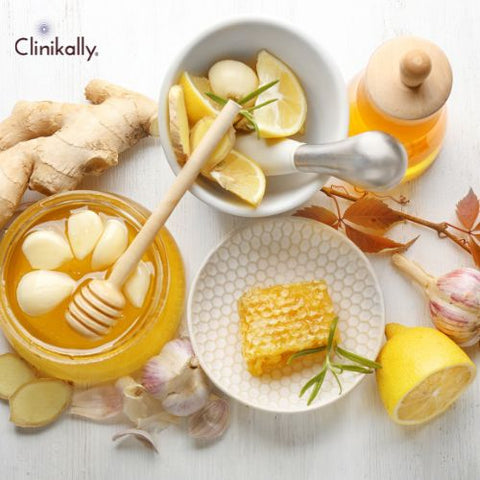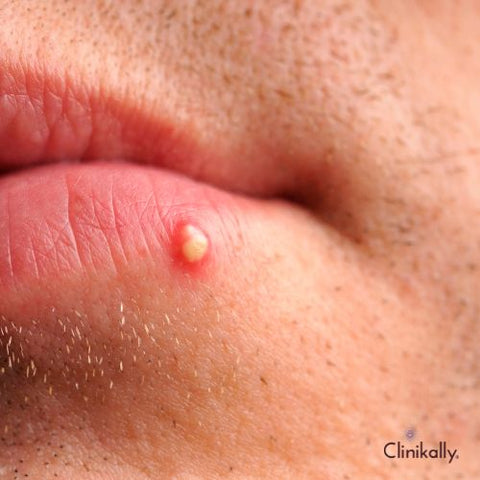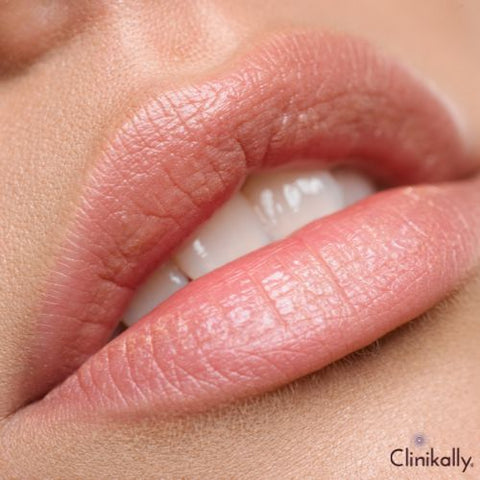Pimples on the lips can be uncomfortable and embarrassing, but there are treatments available. Here are some pointers to get you started:
-
Cleanse the affected area: Wash the area around the zit with a mild facial cleanser. Don't use abrasive soaps or scrubs that might irritate your skin.
-
Apply a warm compress: Soak a fresh washcloth in warm water, and then place it over the zit several times a day for 10 to 15 minutes. This may aid in promoting healing and reducing inflammation.
-
Use over-the-counter acne treatments: Apply a benzoyl peroxide or salicylic acid-containing over-the-counter acne cream or gel to the pimple. These components aid in bacterial eradication and inflammation reduction.
-
Avoid picking or squeezing the pimple: This can lead to further irritation and possibly even infection.
-
Use natural remedies: Apply a dab of tea tree oil, honey, or aloe vera gel to the pimple. These natural remedies have antibacterial and anti-inflammatory properties that can help to reduce inflammation and promote healing.
-
Maintaining moist lips: To keep your lips supple and hydrated, apply a lip balm or moisturizer. Dry lips can aggravate pimples and make them more noticeable.
-
Watch what you eat: Foods like chocolate, dairy, and spicy foods can cause acne outbreaks. If you observe a connection between eating these foods and getting pimples on your lips, stay away from them.
If the pimple on your lip persists or becomes infected, see a dermatologist.
Understanding Lip Acne: Causes and Symptoms

Lip acne develops when hair follicles become clogged with oil, dirt, dead skin cells, or bacteria. This can cause small red or white bumps to form on the lips or around the lipline. Lip acne can be painful and uncomfortable, and it can also cause swelling and inflammation in some cases. There are many causes of lip acne, but a few of the most prevalent ones are as follows:
-
Changes in hormones: Changes in hormone levels can result in an increase in sebum production, which can clog pores and cause acne.
-
Poor hygiene: A buildup of oil, dirt, and bacteria can result from improper lip and mouth cleaning.
-
Use of comedogenic or irritating products: Some lip balms, lipsticks, and other cosmetics can irritate or clog pores, causing acne to flare up.
-
Stress: Excessive stress can lead to hormonal changes that exacerbate acne.
-
Diet: Consuming foods that are high in sugar, dairy, or processed ingredients can contribute to inflammation and acne breakouts.
The symptoms of lip acne can include small red or white bumps on the lip or around the lip line, pain, tenderness, and swelling. In some cases, lip acne may also cause the formation of a pimple or a blister-like lesion.
Hormonal Imbalance and Lip Acne
Hormonal imbalance is a common cause of lip acne because it causes the skin to produce too much oil. Androgens, which are present in both males and females, can stimulate the skin's sebaceous glands to produce more sebum, the oily substance that can clog pores and cause acne.
Numerous conditions, such as pregnancy, menopause, polycystic ovary syndrome (PCOS), and hormonal birth control, can lead to hormonal imbalances in women. Men can develop acne due to hormonal imbalances, though this is less common. In addition to hormonal imbalances, lip acne can also be brought on by poor hygiene, the use of comedogenic (pore-clogging) cosmetics, and some medications. Lip acne may also be more common in acne sufferers.
Overcoming Acne Scars on Lips
Acne scars on the lips can be aggravating and have a negative impact on a person's self-esteem. However, there are several options for reducing the visibility of these scars.
-
Chemical peels: In a chemical peel, a solution is applied to the skin, causing the top layer to peel off to reveal new, fresh skin beneath. Chemical peels can help to lessen the visibility of acne scars on the lips.
-
Microdermabrasion: In microdermabrasion, the top layer of dead skin cells is removed by gently exfoliating the skin with a device. This can assist in lessening the visibility of lip acne scars.
-
Laser therapy: Laser therapy may be useful in lessening the visibility of lip acne scars. The laser works by heating the skin, which encourages the synthesis of collagen, a protein that helps to hydrate the skin and lessen the visibility of scars.
-
Fillers: Fillers can be injected into the lips to help plump them up and hide acne scars. Hyaluronic acid, a naturally occurring substance in the body, and collagen, a protein that gives the skin its structure, are examples of common fillers.
-
Treatments applied topically: There are a variety of topical solutions that can lessen the visibility of acne scars on the lips. These include retinoids, which are a form of vitamin A, and alpha hydroxy acids (AHAs), which are natural acids that help to exfoliate the skin.
It's important to keep in mind that acne scars on the lips can take time to fade and that the ideal results may require a combination of treatments. To find out the best course of action for your particular needs, it's also crucial to consult a dermatologist or other healthcare professional.
Home Remedies for Lip Pimples: Natural Solutions for Acne

There are a variety of natural treatments and preventative measures for lip acne. Here are a few all-natural remedies for acne:
-
Honey: Honey has antibacterial qualities that can help to lessen swelling and kill bacteria that cause acne. Apply a tiny bit of honey to the zit, let it sit for 15 to 20 minutes, and then rinse it off with warm water.
-
Tea tree oil: A natural antiseptic that can aid in the eradication of acne-causing bacteria is tea tree oil. Mix a few drops of tea tree oil with carrier oil, such as coconut oil, and apply to the pimple using a cotton swab.
-
Aloe vera: Aloe vera's anti-inflammatory properties can aid in reducing swelling and redness. The pimple should be treated with a small amount of aloe vera gel, which should be left on for 10 to 15 minutes before being removed with warm water.
-
Ice: Applying ice to a pimple can help to lessen its redness and inflammation. An ice cube wrapped in a towel should be applied to the zit for a few minutes.
-
Green tea: Antioxidants found in green tea can fight acne-causing bacteria and reduce inflammation. A green tea bag should be steeped in hot water for a short while before letting it cool. For a few minutes, apply the tea bag to the zit.
-
Turmeric: Turmeric has anti-inflammatory properties that can help to reduce swelling and redness. Apply a paste made from a small amount of turmeric and water to the pimple. Leave on for 10-15 minutes before rinsing off with warm water.
-
Apple cider vinegar: Apple cider vinegar has antibacterial properties that may help to eradicate bacteria that cause acne. Mix equal parts apple cider vinegar and water, and apply to the pimple using a cotton swab.
It's important to remember that even though these natural remedies have a chance of working, they might not. Additionally, it's important to avoid popping or picking at pimples on the lips because doing so can cause scarring and additional inflammation. It might be necessary to see a dermatologist for additional treatment if home remedies are ineffective.
DIY Remedies for Acne on Lips
Here are some DIY remedies for acne on the lips:
-
Tea tree oil should be mixed with carrier oil, such as coconut or almond oil, before being applied directly to a lip pimple. Tea tree oil has anti-inflammatory and antibacterial properties that can help lessen swelling and redness.
-
Apply a small amount of aloe vera gel to your lip pimple. Aloe vera has anti-inflammatory and antibacterial qualities that can help to lessen swelling and redness.
-
Using a cotton ball, apply witch hazel to the pimple on your lip. Witch hazel contains astringent properties that can aid in the reduction of inflammation and redness.
-
Apply a small amount of raw honey to your lip pimple and leave it on for 15-20 minutes before rinsing. Honey contains antibacterial properties that can aid in the fight against acne-causing bacteria.
-
Make a paste of turmeric powder and water and apply it directly to the pimple on your lip. Turmeric contains anti-inflammatory and antibacterial properties that can aid in the reduction of inflammation and the killing of acne-causing bacteria.
To make sure you are not allergic to any of the ingredients, always perform a patch test before using these remedies. Stop using the remedy right away if you feel any irritation or discomfort.
The Role of Diet in Lip Acne Prevention
Diet is extremely important in the prevention of lip acne. A well-balanced, vitamin- and mineral-rich diet can help reduce inflammation and prevent breakouts. Here are some dietary recommendations to help prevent lip acne:
-
Increase your consumption of fruits and vegetables: Antioxidants found in fruits and vegetables help to reduce inflammation and support healthy skin. Some good examples include berries, leafy greens, carrots, and bell peppers.
-
Drink a lot of water: Keeping your skin hydrated can help you avoid breakouts. Aim for eight glasses of water or more each day.
-
Avoid processed and sugary foods: Consuming processed and sugary foods can increase inflammation in the body, which can result in breakouts. Try to limit your intake of these types of foods.
-
Increase your intake of omega-3 fatty acids: Omega-3 fatty acids have anti-inflammatory properties that can help prevent breakouts. Good sources of omega-3s include fatty fish, nuts, and seeds.
-
Limit your intake of dairy: Some studies have found a link between dairy consumption and acne. If you're prone to lip acne, try reducing your intake of dairy products and see if it helps.
Remember that everyone's skin is different, and what works for one person may not work for another. It's always a good idea to discuss the best course of treatment with your dermatologist if you're having lip acne issues.
Skin Care Routine for Acne-prone Lips: Managing Skin Inflammation

The best way to control skin inflammation if you frequently get acne on your lips is to keep up a good skincare regimen. Here are some pointers for developing a skincare routine for lips with acne:
-
Cleanse gently: Cleanse your lips gently with a mild, fragrance-free, and non-comedogenic cleanser. Avoid using harsh soaps or scrubs that can irritate the skin and cause breakouts.
-
Exfoliate frequently: Removing dead skin cells and unclogging pores by exfoliating your lips once or twice a week can help. Use a gentle exfoliant designed specifically for the lips instead of anything abrasive that might irritate them.
-
Use a toner: Apply a toner that contains salicylic acid or glycolic acid to help remove excess oil and dead skin cells from the surface of your lips. This will help prevent clogged pores and reduce the likelihood of acne breakouts.
-
Moisturize: Moisturize your lips with a non-comedogenic, fragrance-free moisturizer. Look for a product with ceramides, hyaluronic acid, or glycerin among other ingredients that can hydrate your skin without clogging your pores.
-
Protect your lips: Apply a lip balm with SPF protection to protect your lips from the sun's harmful rays. Exposure to the sun can cause further inflammation and exacerbate acne on your lips.
-
Avoid touching your lips: Touching your lips or picking at pimples can aggravate the condition and make scarring more likely.
-
Control your stress: Stress can cause hormonal imbalances that can result in acne breakouts. Incorporate stress-reduction practices into your daily routine, such as yoga, meditation, or physical activity.
You can manage acne-prone lips and encourage healthy, clear skin by implementing these suggestions into your skincare routine. If you experience severe or persistent acne on your lips, consult a dermatologist for professional advice and treatment options.
The Importance of Cleansing and Hygiene
To prevent and treat acne, including acne on the lips, it's essential to practice good hygiene and a regular cleansing regimen. The following are crucial pointers to bear in mind:
-
Wash your face and lips frequently: Wash your face and lips twice a day with a mild cleanser. This will assist in removing extra oil, dirt, and bacteria that can clog pores and cause acne. Avoid using harsh scrubs or exfoliants that can irritate the skin.
-
Don't touch your lips: Don't use your fingers or other objects to touch your lips. This can cause acne breakouts by transferring bacteria and oil from your hands or other surfaces to your lips.
-
Do not use lip balms that are oily or heavy: Some ingredients in lip balms have the potential to clog pores and worsen acne. Look for ointments or lip balms that are breathable, non-comedogenic (non-pore-clogging), and won't result in breakouts.
-
Use non-comedogenic makeup and skin care products: When shopping for makeup and skin care products, look for products that are labeled "non-comedogenic" or "oil-free." These products are less likely to clog pores and cause acne.
-
Utilize clean towels and washcloths: Each time you wash your face and lips, use clean towels and washcloths. This will aid in limiting the spread of oil and bacteria.
-
Practice good oral hygiene: Brush your teeth twice a day and floss daily to help prevent bacteria from accumulating on your lips and in your mouth.
Moisturizing Tips for Acne-prone Skin
Moisturizing is an important part of any skincare routine, especially for acne-prone skin. However, it is critical to select a moisturizer that will not clog pores or exacerbate breakouts. Here are some moisturizing tips for acne-prone skin:
-
Look for non-comedogenic or oil-free moisturizers: These moisturizers are designed specifically to avoid clogging pores and causing breakouts.
-
Choose a lightweight moisturizer: Heavy creams or oils can be too rich for acne-prone skin, leading to congestion and breakouts. Instead, opt for a lightweight moisturizer that absorbs easily into the skin.
-
Use a water-based moisturizer: Water-based moisturizers are less likely to clog pores than oil-based ones. Look for hydrating ingredients that won't clog pores, such as hyaluronic acid, glycerin, or aloe vera.
-
Avoid fragrances and essential oils: These can be irritating to acne-prone skin and may exacerbate breakouts.
-
Moisturize after cleansing: Apply your moisturizer immediately after cleansing your face to lock in hydration and prevent dryness.
-
Avoid over-moisturizing: While keeping your skin hydrated is important, doing so excessively can cause breakouts and clogged pores. Use only a small amount of moisturizer and avoid applying it too frequently.
These suggestions will help you maintain healthy, hydrated skin for acne-prone skin without causing breakouts to get worse.
Non-comedogenic Skincare Products for Lip Acne
Lip acne is a frustrating and unpleasant condition. Using non-comedogenic skincare products can help prevent clogged pores and reduce breakout risk. Consider the following non-comedogenic skincare products for lip acne:
-
Cleanser: The natural oils in your skin shouldn't be stripped away by a harsh cleanser. Choose products that are fragrance- and harsh-chemical-free, oil-free, and oil-free. FCL Alpha Beta Acne Cleanser and Cetaphil Gentle Skin Cleanser (Dry to Normal, Sensitive Skin) are good options.
-
Moisturizer: Choose a lightweight, oil-free moisturizer that won't clog your pores. Look for products that contain salicylic acid, which can help exfoliate the skin and prevent clogged pores. Clinikally HydraSoothe Moisturiser and IPCA Acne-OC Sebum Regulating Moisturizer are good choices.
-
Lip balm: Pick a non-comedogenic variety that won't clog your pores. Look for products devoid of heavy oils and fragrances. Melalumin Lip Lightener SPF 15, Sebamed Lip Defense Triple Protection SPF 30 and iS Clinical Lip Duo are good options.
-
Sunscreen: To shield your skin from the sun's damaging UV rays, choose a non-comedogenic sunscreen. Look for products that are light and free of oil. Clinikally SunProtect Sunscreen SPF 50/PA+++ and Aclaris Photon 360 Hydra Sunscreen Fluid Cream SPF 50+ are good choices.
-
Spot treatment: Salicylic acid or benzoyl peroxide-based spot treatments can help you get rid of particularly stubborn blemishes quickly. Noreva Exfoliac Acnomega 200 and FCL Alpha Beta Acne Cleanser are good options.
You can aid in preventing lip acne and maintaining clear, healthy-looking skin by using non-comedogenic skincare products.
Stress Management and Other Skin Care Tips for Acne-prone Lips

Acne-prone lips can be a frustrating and unpleasant condition, but there are several treatments available. Here are some stress-reduction and skincare tips for acne-prone lips:
-
Manage stress: Stress can aggravate acne-prone skin, making stress management crucial. To manage stress, try yoga, deep breathing, meditation, or other stress-relieving exercises.
-
Avoid picking at your lips: Lip picking can irritate the area more and leave scars. Try to avoid touching or picking at your lips.
-
Avoid harsh lip products: Harsh lip products can irritate the skin and exacerbate acne-prone lips. Avoid products containing fragrances, dyes, or other irritants.
-
Keep hydrated: Water is essential for keeping your body and skin hydrated. Dehydrated skin can make lips prone to acne worse.
-
Cleanse your lips: Use a gentle cleanser to cleanse your lips daily. Avoid harsh scrubs or exfoliants, which can cause further irritation.
-
Moisturize your lips: Use a non-comedogenic moisturizer to keep your lips hydrated. Look for products containing ingredients like hyaluronic acid or glycerin, which can help hydrate the skin without clogging pores.
-
Use lip balms with caution: Avoid using lip balms that contain fragrances or heavy oils, which can exacerbate acne-prone lips. Look for products with calming components like vitamin E or aloe vera.
You can manage acne-prone lips and keep your skin looking healthy and clear by implementing these stress management and skincare tips.
Mindful Practices to Manage Stress and Acne
Stress management can be an important part of managing acne-prone skin. Stress can cause hormonal imbalances, increase inflammation, and worsen acne. Here are some mindfulness practices that can help with stress and acne management:
-
Meditation: Regular meditation practice can help the body's inflammation, stress, and anxiety levels. Daily mindfulness meditation for even a short period of time can be helpful.
-
Yoga: Yoga is a relaxing exercise that can help with stress management. Certain yoga poses, such as forward folds and inversions, can also improve circulation and promote healthy skin.
-
Deep breathing: Paying attention to your breath while taking deep breaths can help you relax and lower your stress levels.
-
Exercise: Getting regular exercise can lower stress and enhance general health. The skin's blood flow and oxygenation are also supported by exercise.
-
Journaling: Putting your thoughts and emotions in writing can be a cathartic way to cope with stress and anxiety. Journaling can also be used to find patterns and triggers that aggravate acne-prone skin.
-
Eating mindfully: Eating a nutritious, well-balanced diet can help reduce stress and support beautiful skin. Include a lot of fresh produce, lean proteins, healthy fats, and lean proteins in your diet.
-
Skincare routine: Developing a regular skincare routine can ease the symptoms of acne and help you unwind. Use non-comedogenic products and stay away from abrasive scrubs or exfoliants.
You can manage stress and encourage healthy, clear skin by incorporating these mindful activities into your daily routine.
Essential Oils for Acne-prone Skin
Essential oils can be a natural and effective acne treatment. However, essential oils should be used with caution because they can be irritating to the skin if not properly diluted. Here are some essential oils that can help acne-prone skin:
-
Tea tree oil: Tea tree oil is one of the most popular essential oils for acne-prone skin. It has inherently antimicrobial qualities that can help kill skin-related bacteria and lessen inflammation. Tea tree oil should be properly diluted before being applied to the skin because using it undiluted can irritate the skin.
-
Lavender oil: Lavender oil naturally fights bacteria and soothes inflammation, which can help lessen acne outbreaks. The management of acne-prone skin may also benefit from its ability to encourage relaxation and lower stress levels.
-
Frankincense oil: Frankincense oil has natural astringent properties that can help minimize pore size and enhance the texture of the skin overall. It also has anti-inflammatory qualities that can aid in easing irritation and redness.
-
Rosehip oil: Rosehip oil is abundant in vitamin C, which can help brighten the skin and lessen the visibility of acne scars. It also has anti-inflammatory properties that can help reduce redness and irritation.
-
Clary sage oil: Clary sage oil naturally fights bacteria and inflammation, which can lessen acne outbreaks. It can also help regulate sebum production and reduce the appearance of pores.
When using essential oils on skin that is prone to acne, proper dilution is imperative before applying the oils to the skin. Because they can irritate and cause allergic reactions, essential oils should never be applied directly to the skin. You should always perform a patch test on your skin before applying any new essential oils to it.
Blackhead Removal on Lips: Dos and Don'ts
Blackheads on the lips are a common problem for many people, but they must be removed with caution to avoid further irritation or damage to the skin. Here are some tips for getting rid of blackheads on your lips:
Dos:
-
Exfoliating the lips can help get rid of skin debris and lessen the visibility of blackheads. Lips can be exfoliated gently by using a lip scrub or a toothbrush with soft bristles.
-
Warm compresses on the lips can help open pores and facilitate the removal of blackheads. Blackheads can be removed by placing a clean cloth that has been soaked in warm water on the lips for a short period of time.
-
Blackheads on the lips may be removed successfully using blackhead removal tools. To remove a blackhead, gently press down on it with a sterile tool.
-
Applying a salicylic acid-containing toner can help clear clogged pores and stop the development of new blackheads.
Don'ts:
-
Squeezing blackheads with your fingers can cause further irritation and damage to the skin. It can also lead to scarring and infection.
-
Exfoliants, scrubs, and other harsh products can aggravate blackheads by irritating the skin. Use gentle, non-comedogenic products only.
-
Lips that have been overly exfoliated may become dry and irritated. Just do it once or twice a week.
-
Popular home remedies for blackheads sometimes include toothpaste, but this can actually irritate and harm the skin more.
It is essential to approach blackhead removal on the lips cautiously and to abstain from any harmful or abrasive procedures. Be gentle, use sterile implements, and stick to mild, non-comedogenic products when treating blackheads on the lips.
































